Rh Factor: What you need to know during an unplanned pregnancy

What is Rh Factor?
Rh factor is a protein that most people will have on the surface of their red blood cells. [1] If your red blood cells have this protein, you are Rh positive, like most people. On the other hand, if your red blood cells do not have this protein, you would be Rh negative. According to research, about 15 to 17 percent of Caucasians (North American and European descent) are Rh negative, while 4 to 8 percent of people of African descent and 0.1 to 0.3 percent of people of Asian descent are Rh negative. [2] Your Rh factor will not effect your overall health.
Why is it a problem if I'm Rh negative during pregnancy?
It’s important to get your blood tested early in your pregnancy. Women who are Rh negative and don’t receive the proper care may face complications in future pregnancies. If you are Rh negative, there is a possibility of your blood reacting with your baby’s blood. [3]
Your immune system reacts differently and will create antibodies. These antibodies start an attack on your baby’s red blood cells because your body thinks it’s a foreign object. [4] Although you will not know your baby’s blood type until they are born, it’s safest to assume it’s positive. These antibodies will remain in your body, and if you were to become pregnant again in the future, the antibodies can again attack your baby’s red blood cells. [5] This can result in Rh disease or hemolytic disease of the fetus, which can lead to:
- Miscarriage or stillbirth
- Brain damage
- Heart failure
How is Rh incompatibility treated?
The treatment for Rh incompatibility is treated by medication called Rh immune globulin. [6] This medication is received as a shot and is administered around 28 weeks of pregnancy. [7] The medication prevents Rh positive antibodies from being made. It is given again 72 hours after delivery.This medication is only helpful if your body does not already have the antibodies. If your body already has the antibodies the best treatment is to be monitored the rest of your pregnancy because the baby is at risk of Rh disease.


